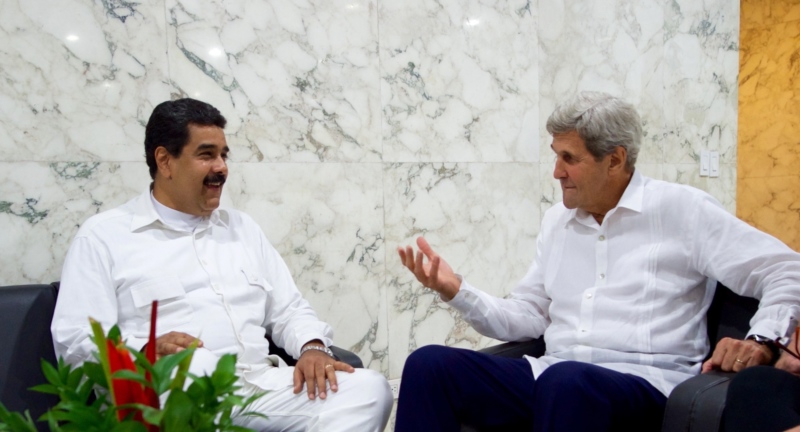Latin America Advisor
A Daily Publication of The Dialogue
Does the U.S. Have a Place in Resolving Venezuela’s Crisis?
 Venezuelan President Nicolás Maduro and U.S. Secretary of State John Kerry (L-R) met last month in Cartagena, Colombia.
Venezuelan President Nicolás Maduro and U.S. Secretary of State John Kerry (L-R) met last month in Cartagena, Colombia.
Following a meeting between Venezuelan President Nicolás Maduro and U.S. Secretary of State John Kerry on the sidelines of the signing of peace agreement between the Colombian government and the FARC rebel group, Maduro said a top U.S. diplomat would soon visit Caracas in order to jointly explore easing tensions between the two countries. Has Maduro experienced a change of heart toward the United States? What might be the goal for improved relations between the two countries? How would the meeting differ from top U.S. diplomat Thomas Shannon’s meeting in Caracas in June? Does the recent announcement from OPEC of a preliminary agreement to cut oil production change the dynamic between cash-strapped Venezuela and the United States?
Diego Arria, member of the Advisor board and director at the Columbus Group: "Maduro has not had a change of heart at all. The Venezuelan president has been playing the U.S. diplomats to gain time, which he badly needs, facing at least 80 percent public rejection in the midst of a growing humanitarian tragedy as well as an economic and social collapse. The top U.S. diplomat, barring Secretary Kerry, would be Ambassador Shannon, again insisting on restarting a botched initial dialogue that even the Venezuelan Catholic bishops found inadvisable, as the regime is not willing to consider fundamental issues such as holding a presidential recall referendum this year, nor the liberation of political prisoners. By now it should be evident to the United States that improved relations with Venezuela while Maduro remains in power is impossible. It is difficult to understand why the United States continues to persist in a dialogue that in my view has more to do with not affecting its normalization process with Cuba than with the Venezuelan process. The U.S. should also acknowledge that many of the principal officers of the Venezuelan armed forces are associated with the drug cartels (the U.S. Treasury Department has imposed sanctions on seven individual armed forces members). And even though the armed forces are really in command of the Maduro regime, they are not included in the dialogue. Finally, the U.S. should evaluate the significance of the fear that the Colombian electorate felt by the influence of the Chávez/Maduro regime in voting against the peace agreement negotiated in Havana."
Riordan Roett, director of the Latin American Studies program at the Johns Hopkins University’s School of Advanced International Studies: "Given the political, economic and social turmoil in Venezuela—a failed state—the visit of a senior U.S. diplomat should be seen as a symbolic gesture of statecraft. Unless Maduro is willing to allow the recall referendum to proceed, release political prisoners and address the imploding economy, there does not seem to be much of an agenda for such a meeting. Maduro appears oblivious to the deteriorating situation in Venezuela. Reports on the failed public health system, for example, results in a comment by the president that the country has the best health system in the Americas. Food shortages, closed or mal-functioning schools and rising violence apparently are not part of his day-to-day ‘reality.’ The Chavista model is now history. All the U.S. can do is repeat what Ambassador Thomas Shannon and Secretary John Kerry probably said in their meetings with Maduro: respect civil liberties and human rights, allow freedom of expression, and give the Venezuelan people the right to vote in the recall referendum. Nothing in recent comments from the government indicates willingness to compromise or to acknowledge the realities on the ground. The OPEC preliminary agreement, if implemented, will make little difference to U.S.-Venezuelan relations. The Chavista regime has basically gutted PDVSA. It will take years to restore the company to its former level of performance given the absence of investment in recent years. The country teeters on the edge of default, and a modest increase in global oil prices will only make a difference at the margin."
Julia Buxton, professor of comparative politics at the School of Public Policy of Central European University in Budapest: "The salience of this meeting is overstated. With the U.S. presidential elections rapidly approaching, Secretary of State John Kerry has limited time or leverage over Venezuela. There is pressure on the United States from some hemispheric partners and Venezuela’s opposition movement to weigh in heavily on the recall and on the imprisonment of opposition figures. The reality is that U.S. attention is focused elsewhere and is likely to be averted from Venezuela for weeks if not months to come (barring the incoming president making it a top foreign policy priority)—by which time the window for a 2016 recall referendum will have closed. It does not seem that there has been a particular change of heart on the part of Venezuela. There has been a constant, if rebuffed, pursuit of the United States and improved bilateral ties for many years, but on sovereign terms and without concessions to U.S. demands. It is difficult to see what significant positives could come out of a high level U.S. diplomatic visit in this context and at this stage in the U.S. presidential term. Certainly Venezuela would like to see a restoration of ambassadorial representation and the lifting of sanctions against senior Venezuelan officials. But Kerry does not seem positioned or inclined to shift course in this direction, which would in any event outrage sections of the opposition. As such, the meeting and any follow up seem more like an exercise in treading water than reconfiguring bilateral ties."
The Latin America Advisor features Q&A from leaders in politics, economics, and finance every business day. It is available to members of the Dialogue's Corporate Program and others by subscription.



















